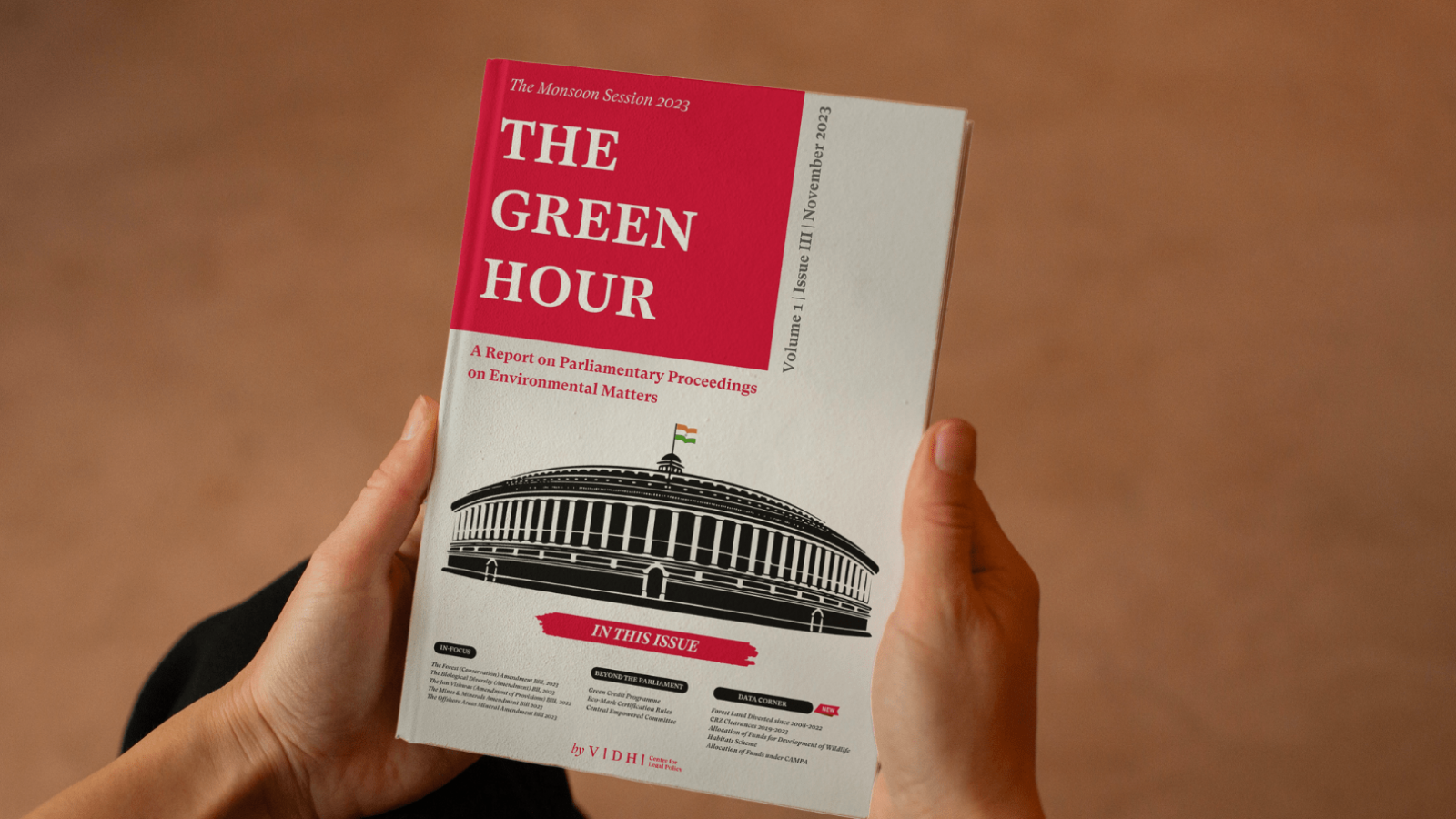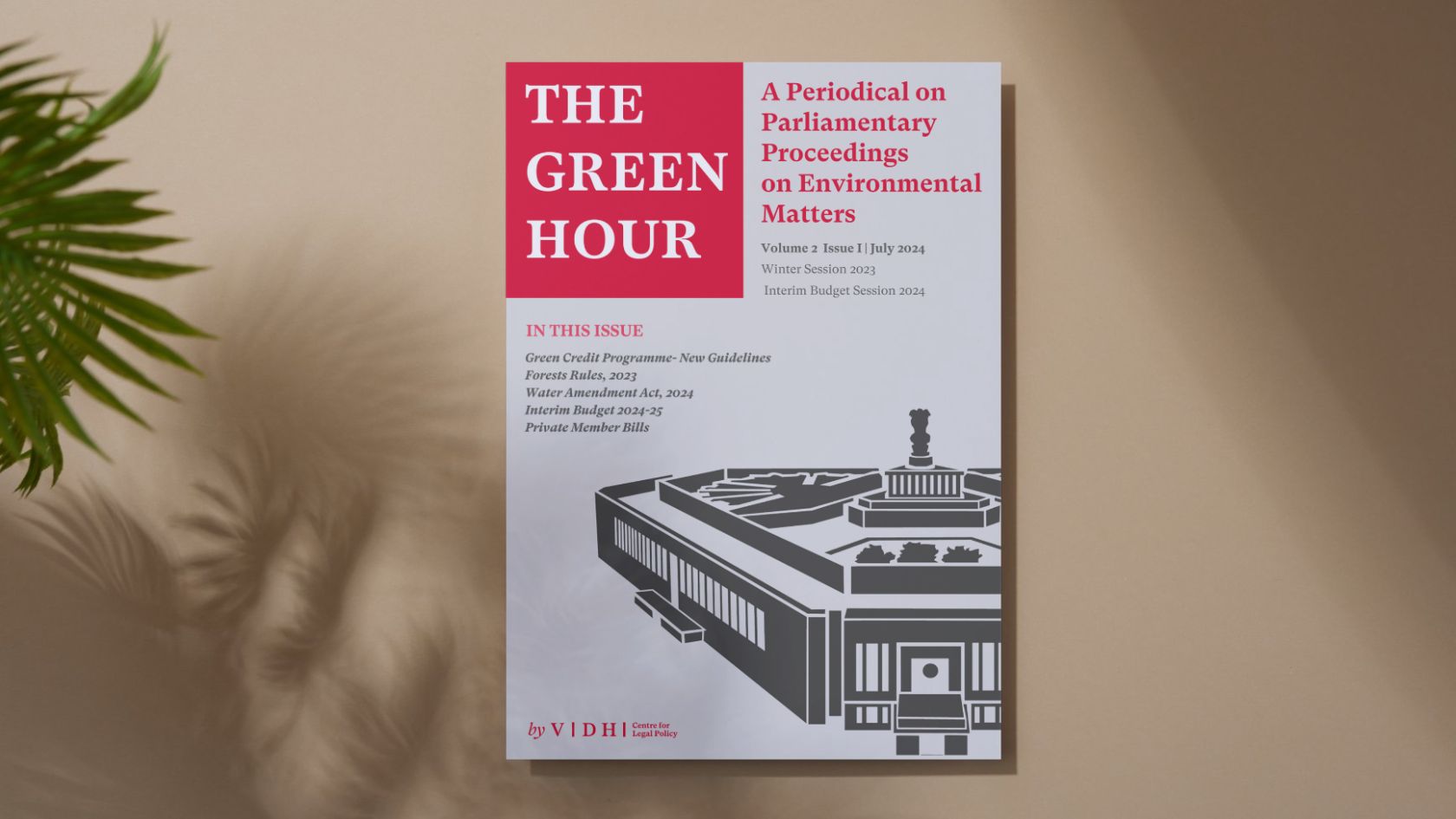
The Green Hour Vol. 1 Issue III | The Monsoon Session 2023
The Green Hour traces environment-related proceedings during each parliamentary session. Issue III of Volume I of The Green Hour covers the Monsoon Session, 2023 (July- August)
This edition, in its 7 Chapters, covers analysis on issues that the Members of Parliament in both the Houses inquired upon during the Question Hour, the responses by Ministry of Environment, Forest and Climate Change (“MoEFCC”), the focus areas of discussions, participation from the States and UTs, environment- related Bills discussed, policy updates outside the Parliament. The newly introduced Chapter IV, titled ‘Data Corner,’ elucidates crucial environment-related data disclosed by the MoEFCC during the Monsoon Session. In addition to the analysis from this session, this edition also comparatively analyses important trends from the last three sessions, i.e., Winter Session ’22, Budget Session ’23, and Monsoon Session ’23.
Key highlights from the Monsoon Session, 2023 are as follows:
- MoEFCC responded to 248 questions (3.4%) out of the 7218 questions responded by the government of India in both the Houses. In the last two sessions, this percentage was close to 4%. Statewise, highest participation was from Uttar Pradesh (15.3%), Maharashtra (12.5%), Andhra Pradesh (11.7%).
- Following the trend from the last two sessions, the theme of ‘Institutional Functioning’ was the most addressed one during this Monsoon Session’ 23 as well, with 43% share in questions. Issues like ‘Central Pollution Control Board’ under the theme of ‘Institutional Functioning’; and ‘air’ and ‘circular economy’ under the theme of ‘Environmental Management’ were most frequently addressed with reference in 39 responses each.

- 5 environment- related Bills were discussed in this session, namely, The Forest (Conservation) Amendment Bill, 2023, The Biological Diversity (Amendment) Bill, 2023, Offshore Areas Mineral (Development and Regulation) Amendment Bill, 2023, The Mines and Minerals (Development and Regulation) Amendment Bill, 2023, The Jan Vishwas (Amendment of Provisions) Bill, 2023. The time allocated to all these Bills for debate and discussion remained underutilised during the session.
- There were 9 environment- related Private Members’ Bills introduced in this session, such as The Man-Animal Conflicts Prevention Board Bill, The Plastic Manufacturing (Regulation) Bill, The Vehicular Pollution Reduction Bill.
- In the Lok Sabha, no Zero Hour was conducted because of repeated disruptions during the session.
- In the Rajya Sabha, there were 2 Zero Hour notices related to the environment out of a total of 15 notices. As compared to previous sessions, this figure was significantly low in this session.
- Under Rule 377 notices, 24 out of 369 notices were on environmental matters in the Monsoon Session. This figure was 61 out of 436 in the Budget Session ’23 and 15 out of 298 in the Winter Session ’22.
- Some important environment-related policy developments took place outside the Parliament as well. Green Credit Programme Implementation Rules, 2023 were notified by the MoEFCC. Draft Ecomark Certification Rules, 2023 were published by the MoEFCC and public comments were invited. The Supreme Court approved the draft notification issued by MoEFCC for the constitution of a new Central Empowered Committee.
The MoEFCC disclosed some crucial environmental data as well during the Monsoon Session’23. The report highlights a few of them, such as, State-wise details of diversion of Forest land under Forest (Conservation) Act, 1980 from 2008 to 2023, State-wise details of the number of infrastructural projects that were granted Coastal Regulation Zone Clearance by the MoEFCC since 2019, state-wise allocation of funds under the Compensatory Afforestation Fund Act.




